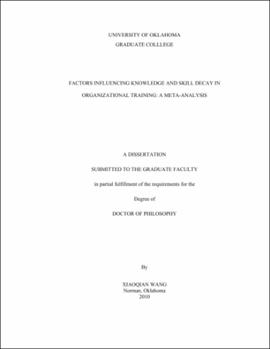| dc.description.abstract | The current meta-analysis summarized existing organizationally-relevant training research on knowledge and skill decay. Results based on 111 independent effects retrieved from 35 manuscripts suggested an overall moderate decay effect (-0.38). The amount of decay was minimal for periods of nonuse less than one day (-0.08); decay was moderate to large for longer periods of nonuse (effect sizes ranged from = -0.24 to -0.84), but there was no clear linear relationship between the amount of decay and length of nonuse. Decay was related to several methodological factors including the operationalization of acquisition, type of evaluation criteria, degree of training structure, and the use of post-training decay-prevention interventions. Decay was related to the combination of cognitive and physical task demands as well as task complexity. Tasks with moderate cognitive demands and minimal physical demands were associated with the greatest decay, whereas tasks with minimal cognitive demands but strong physical demands were associated with the least decay. Complex tasks were associated with modest levels of decay that were unlikely to be moderated by additional factors, but for simpler tasks decay effects were less robust and dependent upon other factors. Regression analysis indicated that decay was primarily related to the length of nonuse, amount of cognitive task demands, and the closed-/open-looped distinction. Longer periods of nonuse, greater cognitive demands, and closed-loop tasks were associated with greater decay. These results are discussed with respect to previous meta-analyses of decay effects. Both practical and theoretical implications are also discussed. | |
